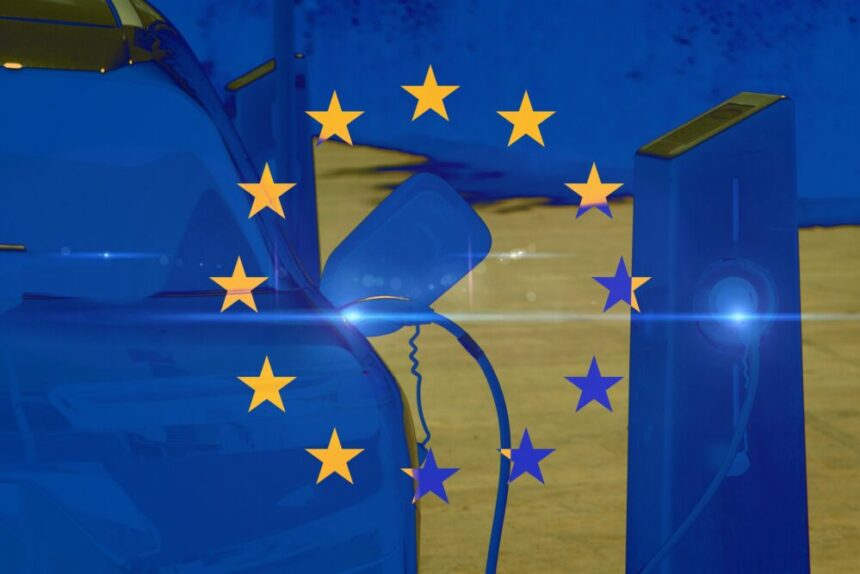Volkswagen Leads European Electric Vehicle Market in October 2024
Volkswagen (VW) enjoyed a strong performance in October as the European electric vehicle (EV) market recorded growth. Tom Hooker, Autovista24 journalist, investigates the latest figures from EV Volumes.
EV deliveries in Central and Western Europe reached 251,560 units in October, growing 1% year on year. However, in the first 10 months of 2024, the plug-in market declined 2.3%, with nearly 2.4 million registrations. Compared to the same period in 2023, this was a loss of nearly 56,000 units.
Battery-electric vehicles (BEVs) made up 67.5% of EV deliveries in October, an increase of 3.4 percentage points (pp) on 12 months ago. Plug-in hybrids (PHEVs) made up the rest of the market.
Despite contrasting results in the month, October’s performance closely followed the annual split. BEVs accounted for 67.4% of plug-in registrations during the first 10 months of 2024, up 0.6pp from the same period in 2023.
Victory for Volkswagen
VW was Europe’s best-selling brand in terms of EV sales during October, with 26,462 deliveries. This was the manufacturer’s first win since July 2023 and its highest monthly volume since June 2023.
Registrations were up 57.9% compared to one year ago, the biggest increase of any carmaker in the top 10. It also equated to a year-on-year difference of over 9,700 units.
VW achieved a 10.5% share in October, surging 3.8pp from 12 months prior. Helping the marque to victory were the ID.4, the ID.7 and the ID.3. These three models all appeared in October’s top 10 best-selling BEVs.
This strong result comes as the dispute continues surrounding the possible closure of some of VW’s German plants and employee pay cuts. Around 100,000 workers have already staged two separate strikes in the past month, the largest in the company’s history, according to Reuters.
BMW’s important year ahead
In second place came BMW, recording 25,279 units. This was a 3.8% improvement on October 2023 and marked the brand’s best monthly total since March 2024. It made up 10% of EV deliveries, up 0.2pp year on year.
BMW has an important year ahead. The carmaker’s CEO, Oliver Zipse, has said 2025 will be crucial, according to Automotive News Europe. This is largely due to the debut of the Neue Klasse, its new series of BEVs, which are expected to begin production in Hungary next year. Zipse also rejected calls for the postponement of the 2025 CO2 targets.
‘We have known the targets set for 2025 since 2019, and we have aligned our model policy accordingly and further increased the efficiency of the powertrains. We see no reason to postpone the CO2 targets for 2025,’ he told Automobilwoche.
Mercedes-Benz took third, reaching 23,231 registrations. This meant three German brands filled the top of the EV table. Its 9.2% share was 0.7pp higher than its hold from one year ago. The brand recently announced its automated driving system, Drive Pilot, has been approved by the KBA to go up to 95kph in Germany.
In fourth, Volvo’s deliveries surged 48% to 20,243 units. The brand captured 8% of the plug-in market, some distance ahead of its 5.5% share in October 2023.
Skoda’s record result
Skoda enjoyed a record result in fifth, thanks to 14,262 registrations. This was a 544-unit improvement on its previous best in September 2024. The manufacturer achieved a 26.5% year-on-year volume growth and a 5.7% share, up 1.2pp.
This performance was boosted by the success of its Skoda Enyaq, which was Europe’s best-selling BEV in October. This was the first time the model had topped the monthly standings.
Meanwhile, in sixth, Tesla suffered its worst result since January 2023. The marque posted 13,556 deliveries, dropping 24.7% compared to 12 months ago. It accounted for 5.4% of EV registrations, behind its 7.2% share from October 2023.
This performance was partly caused by the Tesla Model Y struggling. The crossover failed to top the BEV standings for the first time since October 2022. However, the brand’s quarterly delivery schedule does result in highs and lows month to month.
Tesla is putting a sales initiative in place. The brand is offering one year of free charging at all Tesla Superchargers for European customers who order a new Model Y delivered before 31 December 2024. The carmaker also announced greater power delivery on the latest version of its Superchargers, rising to 500kW.
Audi EV registrations slump
However, an even larger slump was seen in seventh. Audi suffered a 29.4% delivery decline to 13,207 units. Its share fell 2.2pp year on year to 5.3%.
Peugeot secured eighth with 9,716 registrations, down 8.9% compared to 12 months ago. The brand captured 3.9% of the plug-in market, down 0.4pp. Ford enjoyed a 37.3% delivery rise in ninth, with 8,803 units. This equated to a 3.5% share, compared to a 2.6% market hold from one year ago.
The brand recently unveiled the Puma Gen-E, an all-electric version of its best-selling model in Europe. However, Ford announced plans to cut 4,000 jobs in Europe by 2027, equating to a 14% decrease in its workforce.
Rounding out the top 10 was Cupra, with 8,750 registrations. This was a 2.4% increase year on year. The carmaker made up 3.5% of EV deliveries, up 0.1pp on October 2023.
BMW closes in
Even after its October performance, Tesla was still Europe’s best-selling EV brand in the first 10 months of the year. Yet, the manufacturer’s total of 257,860 registrations was 11.3% down on the same period in 2023. Tesla’s share also fell 1.1pp to 10.8%.
BMW currently sits over 20,000 units behind. However, the marque was more than 11,700 deliveries ahead of Tesla in October, with its year-to-date total at 237,704 registrations.
This gap could close further in November if BMW keeps its strong form, with volumes up 17.2% in the first 10 months of 2024. It captured 9.9% of the European EV market from January to October, up 1.6pp.
However, the German carmaker will need a strong result in December if it wants to edge out Tesla for the 2024 title. This is because the latter usually enjoys a delivery peak at the end of each quarter. In 2023, December was Tesla’s third best-selling month of the year, while in December 2022 the brand recorded its highest volume.
Mercedes-Benz took third, with 209,913 registrations. This was 11.5% higher than 12 months prior. The brand made up 8.8% of plug-in deliveries, a 1.1pp improvement year on year.
In fourth place came Volvo, posting 198,251 units. This equated to a 45% surge in registrations, the highest of any manufacturer in the top 10. Its share also jumped 2.7pp to 8.3%. VW finished fifth, with a 13.1% delivery decline. Its total of 176,818 registrations gave it a 7.4% share, down 0.9pp.
Peugeot passes Kia
Sixth place went to Audi, reaching 145,637 units. This was 5% better than the first 10 months of 2023. The marque made up 6.1% of the EV market, up from 5.7% at the same point last year.
Peugeot overtook Kia for seventh, with the former recording 101,939 registrations. This was a 10.2% drop on the same period last year. It took a 4.3% share, slipping 0.3pp.
Kia fell to eighth and saw volumes decline 11.3% between January and October. The month marked the brand’s second-worst performance of 2024, with 7,844 registrations. This brought its total in the first 10 months of the year to 100,588 deliveries. It captured 4.2% of the market, dropping 0.4pp.
The carmaker is sticking to its goal of selling 1.6 million EVs annually by 2030 despite expecting challenging market conditions ahead, according to Reuters.
Ninth place went to Hyundai, with 78,484 deliveries. This was a 15.1% decrease on the same period in 2023 and the biggest decline recorded in the top 10. Its 3.8% share from January to October last year fell to 3.3%.
After its best-ever result, Skoda entered the top 10, displacing MG. Skoda reached 77,740 registrations between January and October, up 3.4%. The carmaker made up 3.2% of plug-in deliveries in the first 10 months of 2024, an increase of 0.1pp year on year.
With Skoda’s current form, it could soon pass Hyundai. The former managed around 6,900 units more than the South Korean manufacturer in October. This closed the gap to just 754 registrations in the first 10 months of the year.





